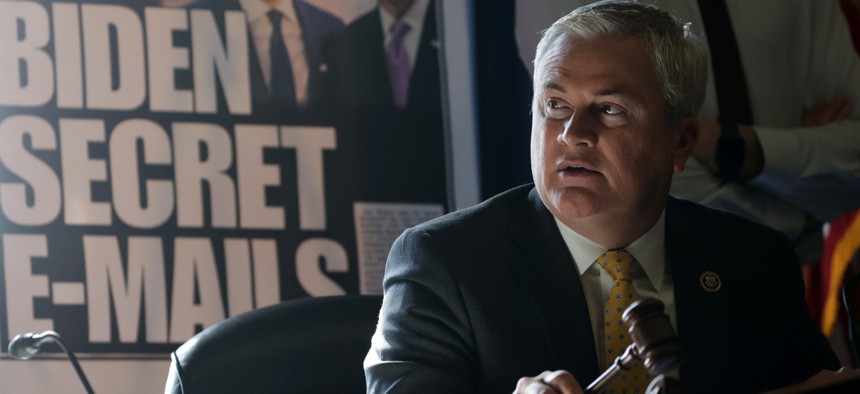
Rep. James Comer, R-Ky., announces a recess during a Feb. 8 hearing on protecting speech from government interference. Comer introduced the bill that has more Hatch Act restrictions. Alex Wong/Getty Images
Feds Would Face New Hatch Act Restrictions on Their Interactions With Private Companies Under a Committee-Backed Bill
Republicans say the measure would prevent government censorship, despite testimony that social media companies acted without federal coercion.
Federal employees could soon face new restrictions on their activities under the Hatch Act, with a House panel on Tuesday advancing a measure to limit their interactions with certain private companies.
The Protecting Speech From Government Interference Act (H.R. 140), which the House Oversight and Accountability Committee approved on party lines, is aimed at preventing federal workers from censoring content on social media platforms. The vote followed months of Republicans suggesting that government officials improperly compelled companies such as Twitter and Facebook to suppress certain stories and limit posts on subjects such as COVID-19 misinformation.
The bill would prohibit federal employees from using their official authority to censor any private entity. Employees would still be able to engage in “lawful actions” within their official authority to perform “legitimate law enforcement functions,” such as combating child pornography, addressing transporting of controlled substances or safeguarding classified national security information. Agencies must report their use of such authorities to the Office of Special Counsel, an independent agency tasked with Hatch Act enforcement.
Rep. James Comer, R-Ky., who chairs the committee and introduced the bill, said it is “inappropriate and dangerous” to determine what is lawful speech within private sector spaces.
“Federal officials, no matter their rank or resources, must be prohibited to coerce the private sector, to suppress certain information or limit the ability of citizens to freely express their own views on a private sector internet platform,” Comer said.
The bill, he added, would expand the political activity restrictions federal employees face in the Hatch Act. Democrats introduced an amendment that would have expanded the exemption to all national security information—saying it would be critical to prevent election interference from foreign countries—but the Republican majority rejected it.
Any violator of the new rules would be subject to disciplinary action ranging from a reprimand to a firing and a five-year debarment from federal service. They could also be subject to fines of up to $1,000.
Rep. Jamie Raskin, D-Md., the committee’s ranking member, said the legislation was not focused on “real problems” and relied upon a “false premise” that government officials sought to suppress a New York Post story regarding Hunter Biden’s laptop. Twitter executives said at an Oversight and Accountability Committee hearing earlier in February that government officials did not pressure them to remove posts regarding the story, a policy the company lifted after 24 hours. Raskin added the measure would have unintended consequences.
“Compelling social media to carry the propaganda of big liars cannot be the meaning of free speech in the 21st century,” Raskin said, adding that private companies should be free to make their own decisions on content moderation.
Rep. Byron Donalds, R-Fla., defended the bill as aimed at preventing federal workers from using their official capacities to promote their personal opinions.
“This is what H.R. 140 is seeking to stop, is government actors putting their own thought processes on short circuiting the process of legitimate debate and open conversation amongst the American people,” Donalds said.
Democrats countered that Republicans were “gaslighting” Americans with their bill, with Rep. Melanie Stansbury, D-N.M., saying the committee’s previous hearing demonstrated the government did not engage in coercement of social media companies regarding the Hunter Biden story. At the hearing, executives noted President Trump’s White House had asked Twitter to remove a tweet criticizing the president. The Biden White House previously said it had flagged posts to social media companies that contained misinformation regarding COVID-19.
Rep. Dan Goldman, D-N.Y., said the bill would chill federal law enforcement personnel from carrying out their duties.
“They're going to be deterred from doing their jobs,” Goldman said.
Rep. Katie Porter, D-Calif., said the measure would have a similar effect on federal scientists, likening the process some employees take on social media to Food and Drug Administration officials issuing food and drug labels.
“Disclaimers and alerts are the way for many government scientists to communicate facts and findings with the public,” Porter said. “Calling factual disclaimers and alerts censorship really targets that specific way that scientists can share their findings.”
Porter introduced an amendment to exempt scientific and technical information from the bill’s definition of censorship, but Republicans defeated it as well. The majority in recent days added language to the bill clarifying that nothing in the bill would prevent federal employees from using an official account to communicate an official policy position or to otherwise release relevant information to the public.
The committee on Tuesday also approved the Accountability for Government Censorship Act, which would require agencies to report on every instance of coercing any company to remove or add a disclaimer to posts. Both bills now head to the House floor for a full vote.







